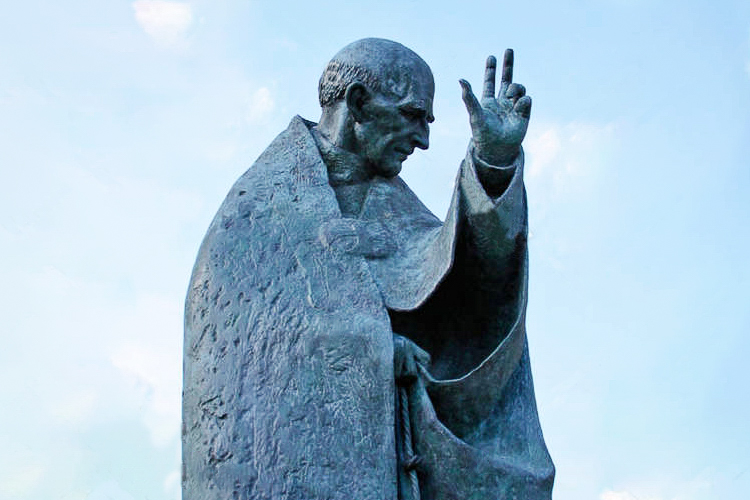
Feast Day: 3 April
Giving up his wealthy upbringing
Saint Richard de Wyche was born in 1197 and died on 3 April 1253. He was born just outside the town of Wyche, now modern day Droitwich, in Worcestershire. Though being born to a rich family, Richard gave up his inheritance to instead serve God and others by living his life as a priest. He studied hard at the University of Oxford and eventually became one of the most intellectual people of his day.
St Richard always tried to live a life that was as committed to serving others as much as possible. He gave up many worldly joys so he could more fully embrace the greater joys he received from wholeheartedly helping others and spending time with God. Several ways he did this were wearing a hair shirt, eating no meat and only ever taking small portions of food.
A strong fighter against corruption and laziness
He was also a keen opponent of corruption and laziness; he clamped down on corrupt clergy, prevented usury and even went as far as insisting other priests stopped mumbling the Mass when they didn’t want to be there.
Due to all these qualities, he was soon proposed to be the new bishop of Chichester. He was the best person for the job but the king had other ideas. King Henry III was looking to increase his influence in the Church and one way he decided to do this was to try and make his supporter the new bishops.
Trouble with the King
St Richard de Wyche had to flee into exile and the land and money of the Bishop of Chichester were taken by the Crown. Only after long negotiations, in which the pope came to the defence of Richard, was he able to come back out of exile to become the bishop – and even then it took a further two years and the threat of being excommunicated for King Henry III to give St Richard his property back.
As bishop, St Richard was a kind-hearted man who cared for all and strongly opposed corruption and false piety. When the men of Lewes dragged a thief out of sanctuary and hanged him, he made them cut down the corpse and bury it in the sanctuary. He did this because the Church was meant to be a place where even the worst people, if they turned back to God, could be forgiven and excepted.
Blessing the salt springs
One of the final things he did before his death was to travel back to his home town of Droitwich to bless the salt springs which had dried up. This was a disaster as to this day the salt springs are one of Droitwich’s most important features and back then was the main employer. With St Richard’s blessing the springs began to flow once more and to this day have never dried out.
St Richard died not long after down in Dover at the age of 56, but his impact was so beneficial and positive to all who met him that within nine years he had been canonised a saint.
Why is St Richard important?
A reflection from someone in our young Catholic community
I have always loved Saint Richard de Wyche. He comes from the same town as me and back in Droitwich he is still considered a minor celebrity. There is a weekend festival in his honour every year around his feast day, a statue in the park of him and my home church has his entire life story in the form of a mosaic on one of the walls.
Saint Richard is an example of being the change you want to see in the world. Even through harsh opposition from those who benefited from a corrupt system, St Richard is proof that through honest, loving dedication to God and refusal to accept wrong just because it’s the norm, we can overcome any injustice.
Prayer by Richard de Wyche
St Richard’s final words on his deathbed were recorded as this prayer below; it is now one of the more well-known saint prayers in the church:
Thanks be to Thee, my Lord Jesus Christ
For all the benefits Thou hast given me,
For all the pains and insults Thou hast borne for me.
O most merciful Redeemer, friend and brother,
May I know Thee more clearly,
Love Thee more dearly,
Follow Thee more nearly.